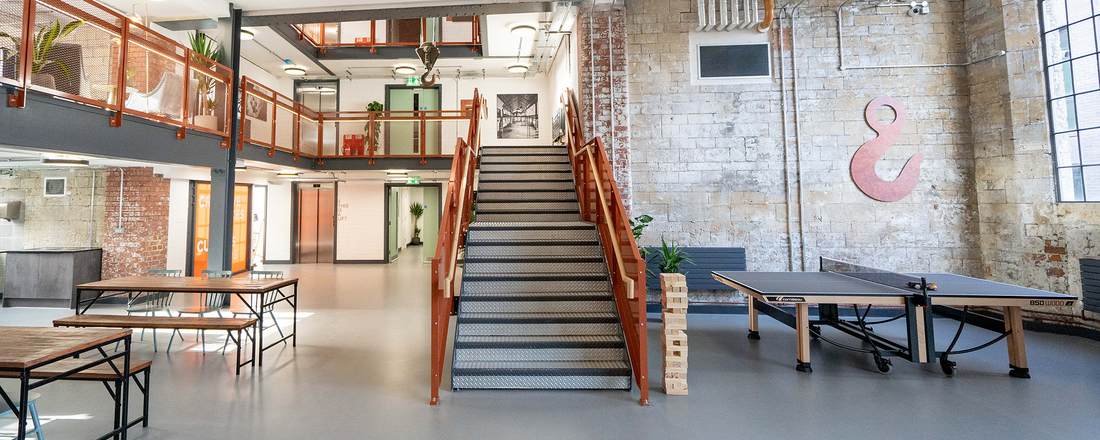Get updates from The Developer straight to your inbox Yes, please!
“We want radiators, not drains” – How to foster community in an office space
The alchemy of a great office requires the right people, a shorter lease, good management and inspiring places and spaces, says Richard Pearce, founder and director TCN in this interview for The Developer Podcast

When it comes to the creative industries, people are looking for workspaces that you want to come to and do things together, says Richard Pearce, founder and director of serviced office developer TCN.
“It’s going to be hybrid working from now on,” Pearce says in the latest episode of The Developer Podcast. “People need to have a reason to get out of their comfortable homes.”
For TCN – which describes itself as a “creative workplace” provider – the offer is an office in a community of creative SME businesses, a location within 10 minutes of a train station and an inspiring heritage building with characterful communal rooms and kitchens.
Their latest project is Newark Works in Bath, a Grade-II listed 40,000 sq ft industrial complex of 4 buildings that have been redesigned into offices by architects Ferguson Mann for 50 businesses of varying size. Built for ’cranemakers to the world’ Stothert & Pitt between 1857 and 1905, the buildings have been refurbished, insulated, given new windows, with added mezzanines and circulation spaces. Pearce says an estimate by Buro Happold figured the refurbishment represented a saving of 70% of carbon emissions over 25 years when compared to demolition and rebuild.
Newly opened, as of December the building is 50% occupied. A joint venture with the council, the office is located in Bath Quays, within the new Bath Enterprise Zone, a hub for digital, tech and creative companies. During a tour MP Wera Hobhouse told the Bath Echo, “Newark Works will help attract a wide range of businesses to our city that will further diversify our economy.”
Pearce believes the old buildings help engender a vibrant community because they come with a sense of history and place that’s hard to replicate in a new building. “We all like buildings where there is heritage, and soul, and character. And we all know that creative industries love a bit of exposed brick and stripped wooden floors.”
I ask Pearce about community – something developers can struggle to foster and orchestrate. “We manage the community really closely,” Pearce says. “We want people who are radiators; we don’t want people who are drains. One business out of 30 can really disrupt the atmosphere in a building.”
If you get a drain in the community, you don’t want to have given them a 15-year lease and then everyone else leaves…
To this end, the right length of lease is key: short enough to oust a “drain”, but long enough to ensure the community isn’t transient, which has meant three to five year leases.
“We don’t want monthly licenses as too many people come and go and disrupt the community,” says Pearce. “But if you get a drain in the community, you don’t want to have given them a 15-year lease and then everyone else leaves…”
Another critical factor is management – TCN have gone completely in-house to create the right level of customer service and culture. “We have members of staff on site that are full-time employees of TCN. That’s the biggest change we’ve made.
“We had an absolute shocker with managing agents… turning up a week after a complaint about a loo being blocked…”
“We had an absolute shocker with managing agents, and I’m not going to name them here, but they are a national agent and the customer service was just appalling: incorrect invoicing, not answering the phones, people turning up a week after a complaint about a loo being blocked…
“To be fair to them, the managing agents in the UK really struggle, because they’re not set up to provide customer service, they’re set up to have long leases and turn up at year five to argue over the rent review.”
As for encouraging collaboration, Pearce prefers a light touch. “You don’t want to be the most fun person at your own party.”
“We look for places where a business can thrive because you have a deep pool of talent resource and people are happy living in that area.”
“What we try to do is create a platform for businesses to come in and do their thing,” Pearce says. “Everything we do is within 2 hours of London, which continues to be a major hub. People want to be able to get to meetings in London two or three times a week, but don’t feel they need to be in London the whole time.
TCN’s first project was in London – a city Pearce describes as “intense and expensive.” They now prefer to develop in cities that are more “enjoyable, affordable” and have a ‘wellness’ side – with green spaces and the ability to cycle or walk to work.
“We look for good cities where there’s a good lifestyle – from affordable living, good schools, where people can walk or cycle to work – those are the macrodynamics,” says Pearce. “Places a business can thrive because you have a deep pool of talent resource and people are happy living in that area.”
As for heritage buildings, Pearce says they “definitely require passion and determination, there’s no doubt about that.” But that creating a “wow-factor” workspace is worth it, as the office grows increasingly hybrid. Their strategy is to work with the oddities of the existing building. “Don’t strip them out and try to create massive footplates. Use those nooks and crannies to create meeting rooms or quiet rooms.”
Subscribe to The Developer Podcast wherever you get your podcasts, and sign up to The Developer Weekly email to find out when new episodes go live. You can support our podcast on Patreon at www.patreon.com/thedeveloperuk
If you love what we do, support us
Ask your organisation to become a member, buy tickets to our events or support us on Patreon
Sign up to our newsletter
Get updates from The Developer straight to your inbox
Thanks to our organisation members
Become a member
© Festival of Place - Tweak Ltd., 124 City Road, London, EC1V 2NX. Tel: 020 3326 7238

